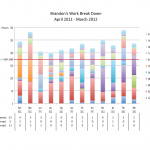Thoughts going into Learning Analytics 2012
Some thoughts going into Learning Analytics 2012 in Vancouver, BC. Since I never got the chance to write up notes from ELI 2012 related to learning analytics, nor my experiences with the LAK MOOK this Spring, I thought I should write this up.
Use of data by academic institutions is not new, institutions have done it for years for admissions process, student services, libraries, and so on. Some of the “newer” interpretations of the use of data focus more on student learning and student activity for the purpose of informing curriculum and administrative & academic services at universities. There are a couple terms for this floating about in the education-space: “learning analytics”, “educational data mining”, “academic analytics” and in the world-at-large: “big data”.
My experiences to date with “learning analytics” has been one of:
- Lack of a coherent definition that causes angst in many. When lurking in the Learning Analytics and Knowledge 2012 MOOC, and following the readings and chatting with a colleague, much of the “course” was a survey of all of the different ways people are thinking about the use of data in education.
- “Religious wars”: strong opinions about the language, activity and value around the application of data, whether that data is applied to improve student learning or to provision services. At ELI 2012 there was a very strong tension between the fear of “learning analytics” driving academia toward behaviorism (if student x does y, then we know or do z) versus a more nuanced interpretation of what we is possible and that we’re building on what’s easy to gather but not as the be all end all.
Going into LAK12, my opinion is one of… “it depends”. It depends what and why one collects, analyzes and implements the results of data. I think it’s useful to see examples of what others are doing with data in this “newer” interpretation, I think ultimately institutions and faculty need to “get their hands dirty” and talk about what problems they face, what they think data might help them understand, and implement experiments to explore things.
Some things are clear (and important) to me, is that we need systems that will allow us to extract data, as well as individuals to analyze and interpret the data. Also, it’s important to me that we be prepared to share the data (with acknowledgement of privacy issues) and not lock data up—“open” and transparency are important and play a role in the “ethics” discussion with respect to learning analytics.

